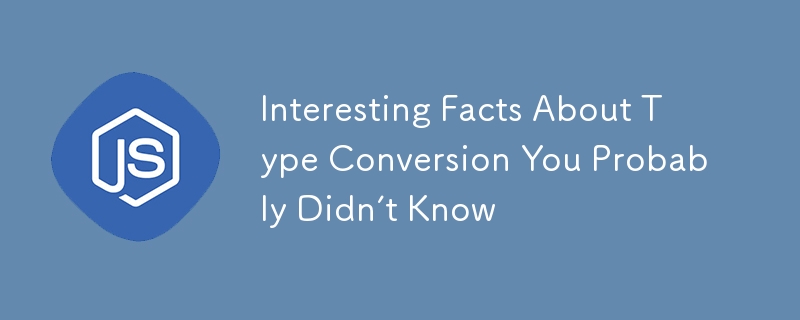Home >Web Front-end >JS Tutorial >Interesting Facts About Type Conversion You Probably Didn't Know
Interesting Facts About Type Conversion You Probably Didn't Know
- WBOYWBOYWBOYWBOYWBOYWBOYWBOYWBOYWBOYWBOYWBOYWBOYWBOriginal
- 2024-09-03 18:34:131246browse

Introduction
Type conversion is more than just a technical necessity; it has a rich history and fascinating nuances that many programmers might not be aware of. Understanding these can provide deeper insights into programming and software development.
Historical Perspective on Type Conversion
The concept of type conversion has evolved significantly over the years.
- Evolution of Type Conversion in Programming Languages: In the early days of programming, type conversion was a manual and error-prone process. With the development of more advanced languages, it has become more automated and reliable.
- Early Programming Languages and Type Conversion: Languages like FORTRAN and COBOL had strict type requirements, making conversions challenging and crucial.
Type Conversion in Different Programming Paradigms
Type conversion is handled differently across programming paradigms:
- Object-Oriented Programming (OOP): In OOP, type conversion is often tied to object casting and polymorphism.
- Functional Programming: Functional programming languages like Haskell handle type conversion through strict type systems.
- Procedural Programming: Procedural languages often require explicit conversion to maintain type safety.
Fun Facts About Type Conversion
There are several interesting facts about type conversion that most programmers might not know:
- The Role of Type Conversion in Machine Learning: Type conversion is crucial in machine learning, especially when dealing with different data types for training models.
- How Type Conversion Influences Database Management: Database systems often require converting data types to maintain consistency and integrity.
Advanced Type Conversion Techniques
For those looking to delve deeper, there are advanced techniques:
- Using Casting Operators: Advanced casting operators in languages like C++ allow for more control over the conversion process.
- Implementing Custom Type Conversions: Some languages allow developers to define custom conversion logic, providing flexibility in handling complex data types.
Future Trends in Type Conversion
Looking forward, type conversion will continue to evolve:
- Type Conversion in Quantum Computing:As quantum computing evolves, new types of data and conversion methods will be required.
- AI and Type Conversion: AI models are beginning to learn how to handle type conversion more efficiently, potentially leading to automated conversion tools.
Conclusion
Type conversion is an ever-evolving field with a rich history and exciting future. By understanding these interesting facts, developers can better appreciate the importance of type conversion in programming.
I have explained Type Conversion in JavaScript with full details in my Blog. Visit my site to learn more in Type Conversion.
FAQs
1. How has type conversion evolved over the years?
Type conversion has evolved from a manual process in early programming languages to a more automated and reliable feature in modern languages.
2. Why is type conversion important in machine learning?
Machine learning algorithms often require specific data types, making conversion crucial for preprocessing data.
3. What is the role of type conversion in database management?
Type conversion ensures data consistency and integrity within databases, especially when integrating data from different sources.
4. Are there advanced techniques for type conversion?
Yes, advanced techniques like using casting operators and implementing custom conversions provide greater control and flexibility.
5. What future trends can we expect in type conversion?
Future trends include new conversion methods for quantum computing and AI-driven automated conversion tools.
The above is the detailed content of Interesting Facts About Type Conversion You Probably Didn't Know. For more information, please follow other related articles on the PHP Chinese website!
Related articles
See more- An in-depth analysis of the Bootstrap list group component
- Detailed explanation of JavaScript function currying
- Complete example of JS password generation and strength detection (with demo source code download)
- Angularjs integrates WeChat UI (weui)
- How to quickly switch between Traditional Chinese and Simplified Chinese with JavaScript and the trick for websites to support switching between Simplified and Traditional Chinese_javascript skills

